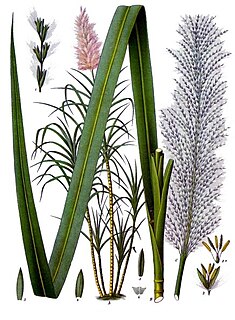
Saccharum is a genus of tall perennial plants of the broomsedge tribe within the grass family.

The Cyperaceae are a family of graminoid (grass-like), monocotyledonous flowering plants known as sedges. The family is large, with some 5,500 known species described in about 90 genera, the largest being the "true sedges" genus Carex with over 2,000 species.
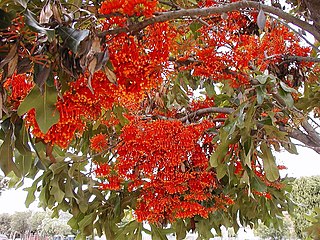
Stenocarpus is a genus of about 22 species of flowering plants in the family Proteaceae. They are trees or shrubs with variably-shaped leaves, zygomorphic, bisexual flowers, the floral tube opening on the lower side before separating into four parts, followed by fruit that is usually a narrow oblong or cylindrical follicle.

Basselinia is a genus of flowering plant in the family Arecaceae. The entire genus is endemic to the Island of New Caledonia in the Pacific. In some molecular phylogenetic analyses, Hedyscepe from Lord Howe Island is nested in Basselinia.
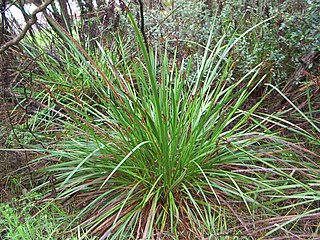
Lepidosperma is a genus of flowering plant of the family Cyperaceae. Most of the species are endemic to Australia, with others native to southern China, southeast Asia, New Guinea, New Caledonia and New Zealand.
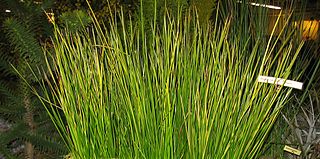
Baumea is a genus of the sedge family, which includes around 30 species native to Madagascar and the Pacific Islands, with 15 species in Australia. All are perennial rhizomatous herbs, with leaves and stems very similar in appearance. The inflorescence is terminal, with the flowers tightly clustered or loosely arranged. The fruits are small nuts.
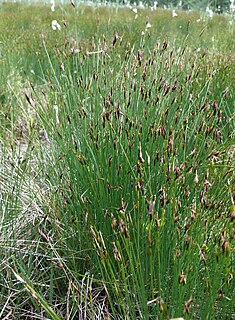
Schoenus is a predominately austral genus of sedges, commonly known as bogrushes, or veldrushes in South Africa. Species of this genus occur mainly in South Africa, Australia and Southeast Asia. Others are found in scattered locations worldwide, from Europe to Asia, North Africa and the Americas. Three species occur in the peatlands of southern South America, including S. antarcticus which is found in Tierra del Fuego, where it forms a component of hyperhumid Magellanic moorland.
Johann Otto Boeckeler was a German apothecary-botanist of Oldenburg. He specialized in the plant family Cyperaceae (sedges), of which, he was the binomial authority of many species.

Machaerina (twigrush) is a genus of flowering plants in the sedge family. Its species occur in tropical America, the West Indies, Malesia, Australia and the Pacific region. The name comes from the Greek machaira, alluding to the shape of the leaves in the type species – Machaerina restioides.
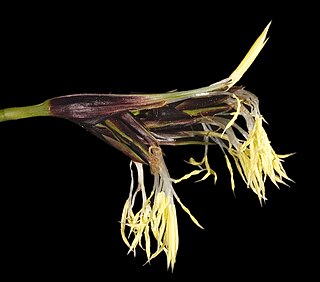
Tetraria is a genus of flowering plants in the sedge family, Cyperaceae, native to Tanzania, South Africa, Borneo, Australia and New Zealand.
Bisboeckelera is a genus of flowering plants belonging to the family Cyperaceae.

Calyptrocarya is a genus of flowering plants belonging to the family Cyperaceae.
Carpha is a genus of flowering plants belonging to the family Cyperaceae.
Lagenocarpus is a genus of flowering plants belonging to the family Cyperaceae.
Pleurostachys is a genus of flowering plants belonging to the family Cyperaceae.
Diplacrum is a genus of flowering plants belonging to the family Cyperaceae.










